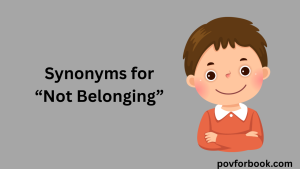There are moments in life when we just don’t fit in—when it feels like we’re standing on the outside looking in. Whether you’re in a new place, surrounded by unfamiliar people, or going through a phase of self-discovery, the feeling of not belonging can be powerful, confusing, and hard to explain.
Fortunately, the English language (and a few borrowed terms) gives us rich, expressive words that capture this sense of emotional disconnection. In this article, we’ll explore 15 synonyms for “not belonging”, each with a deep explanation, emotional context, and subtle differences in meaning. These words are useful not only for writers but for anyone trying to better express or understand that deeply human feeling of being an outsider.
Let’s describe all Synonyms for “Not Belonging” deeply

1. Alienated
Alienated describes the feeling of being emotionally or socially distant from others. It’s more than just being physically apart—you feel like your ideas, values, or identity don’t align with the group or society you’re in. It’s often used when people feel cut off from family, culture, or workplace environments. There’s a painful emotional gap, like you’re watching life happen through glass.
2. Outcast
An outcast is someone who has been rejected or excluded from a group. This word carries a heavier social weight—it’s often linked with shame, judgment, or cultural rejection. Whether someone chooses to be different or is forced into that position, being an outcast means not just not fitting in, but actively being pushed out.
3. Misfit
A misfit is someone who doesn’t quite fit into a particular social setting, not because of wrongdoing, but simply because they’re different. They might be quirky, unique, or hold values that contrast with those around them. While the word can have negative connotations, many people now embrace being a misfit as a form of individuality and creative independence.
4. Outsider
An outsider feels like someone on the edge of a group—observing rather than participating. This word is often used for people who don’t feel like they’re truly part of a community or social group. Sometimes it’s self-imposed; other times it’s a result of exclusion. An outsider may be included physically, but still feel mentally or emotionally disconnected.
5. Estranged
Estranged often refers to emotional distance, especially in relationships. You may be estranged from family members or close friends—people you once belonged with, but now feel disconnected from. There’s often a history behind estrangement, making the feeling more painful and emotionally complex. It’s not just about absence—it’s about a deep loss of connection.
6. Displaced
Displaced refers to being removed from your usual environment, often unwillingly. This could be physical (like refugees being displaced from their homes) or emotional (feeling out of place after a major life change). The word highlights that you did belong somewhere—once—but now you’re in a new space that doesn’t feel like home.
7. Unwelcome
To feel unwelcome is to sense, either subtly or openly, that your presence is not desired. It can be due to culture, behavior, race, ideas, or simple misunderstandings. Unlike some words that describe internal feelings, “unwelcome” points to external signals—glances, body language, or words that make you feel like you shouldn’t be there.
8. Adrift
Feeling adrift means lacking direction, connection, or grounding. Imagine being on a boat without a compass or anchor—that’s what being adrift feels like emotionally. You don’t quite belong anywhere, and you’re floating from one place or group to another without feeling rooted. It’s a word that beautifully captures emotional confusion and lack of belonging.
9. Isolated
Isolated goes beyond being alone. It’s a deep sense of separation from others, either physically, emotionally, or socially. You may be surrounded by people and still feel isolated. It often happens in new environments, during mental health struggles, or after major life shifts. The word touches on the aching loneliness that comes from disconnection.
10. Foreign
While often used in literal contexts (like visiting another country), foreign can describe emotional dissonance too. If you feel foreign in your own hometown, it means the environment, people, or values have shifted away from what once felt familiar. You no longer feel like you “belong” there—it has become strange or distant to you.
11. Rootless
Being rootless means having no emotional or cultural grounding. Like a tree without roots, you might move often, lack family ties, or feel disconnected from traditions and identity. Rootlessness can feel freeing at times, but it often brings a sense of longing and emotional emptiness. It’s a powerful metaphor for disconnection.
12. Marginalized
To be marginalized is to be pushed to the edge of society or a group, often because of race, gender, beliefs, or social class. It’s a systemic form of not belonging—where people are deliberately excluded or treated as less important. This word highlights social injustice and the long-lasting impact of exclusion.
13. Disconnected
Feeling disconnected suggests a loss of emotional ties—not just to people, but also to yourself or your purpose. You may feel like you’re going through life on autopilot, not fully engaging with your surroundings. It’s a quiet form of not belonging, often internal and hard to explain to others.
14. Alone
While alone is a simple word, its emotional impact can be profound. It doesn’t always mean loneliness, but often overlaps with the feeling of not belonging. You can be physically alone or feel emotionally alone in a crowd. It touches on that core human need to be seen, valued, and understood.
15. Unanchored
Similar to “adrift” and “rootless,” unanchored describes an emotional state where you lack a sense of stability or home. You don’t feel tied to any one place, person, or identity. It’s often experienced during life transitions, personal crises, or after losing someone important. The word paints a vivid picture of emotional floating—without security or direction.
Why Do We Sometimes Feel Like We Don’t Belong?
Feeling like we don’t belong is part of the human experience. It can happen due to:
- Moving to a new place
- Cultural or language differences
- Changes in friendships or family
- Personal identity struggles
- Life transitions (graduation, retirement, loss)
But remember: not belonging isn’t always negative. Sometimes it pushes us to grow, explore, and eventually find where we do belong.
FAQs about the Feeling of Not Belonging
Q1: Is it normal to feel like you don’t belong?
Yes, it’s completely normal. Many people feel this way at different points in life. It often signals personal growth or change.
Q2: What’s the difference between an outsider and a misfit?
An outsider is someone who isn’t part of a group—by choice or exclusion. A misfit may be part of the group, but their personality or values don’t align with the others.
Q3: Can these feelings be temporary?
Absolutely. These emotions often come and go with life phases, such as starting a new job, moving, or losing someone. As you settle into new rhythms, the feelings often fade.
Q4: How can I deal with feeling like I don’t belong?
Try:
- Finding like-minded communities
- Talking to someone you trust
- Journaling your feelings
- Practicing self-compassion
- Exploring your identity and values
These actions help you reconnect—with others and with yourself.
Q5: Which word is best for writing fiction or poetry about emotional disconnection?
It depends on the emotional tone. Use alienated or estranged for deeper, darker emotions; adrift or unanchored for poetic descriptions; and outsider or misfit for characters with personality contrasts.
Final Thoughts
Belonging is a basic human need—but not belonging is an equally important part of our journey. It teaches us about identity, resilience, and self-awareness. These 15 synonyms for “not belonging”—alienated, outcast, misfit, outsider, estranged, displaced, unwelcome, adrift, isolated, foreign, rootless, marginalized, disconnected, alone, and unanchored—offer you a full emotional vocabulary for expressing the deep and sometimes painful complexity of disconnection.
Use them in your writing, your self-reflection, or your conversations. Because naming a feeling is the first step toward understanding it—and sometimes, that’s all we really need to start healing.
Read more related articles:
- 500+ Words to Use Instead of “Said”
- Beyond “Proud of You”: 60+ Unique Ways to Celebrate
- Beyond “I Look Forward To”: 50+ Fresh Alternatives
Deven Kumar is the passionate writer and founder behind povforbook.com, a website dedicated to exploring unique perspectives in literature and storytelling. With a deep love for books, language and traveling, Deven aims to inspire readers by sharing insightful reviews, thought-provoking synopses, Guiding tourist by sharing personal experience and engaging content that highlights the power of narrative. When not writing, Deven enjoys connecting with fellow book lovers and traveling lovers and continuously discovering new voices in the literary world.
